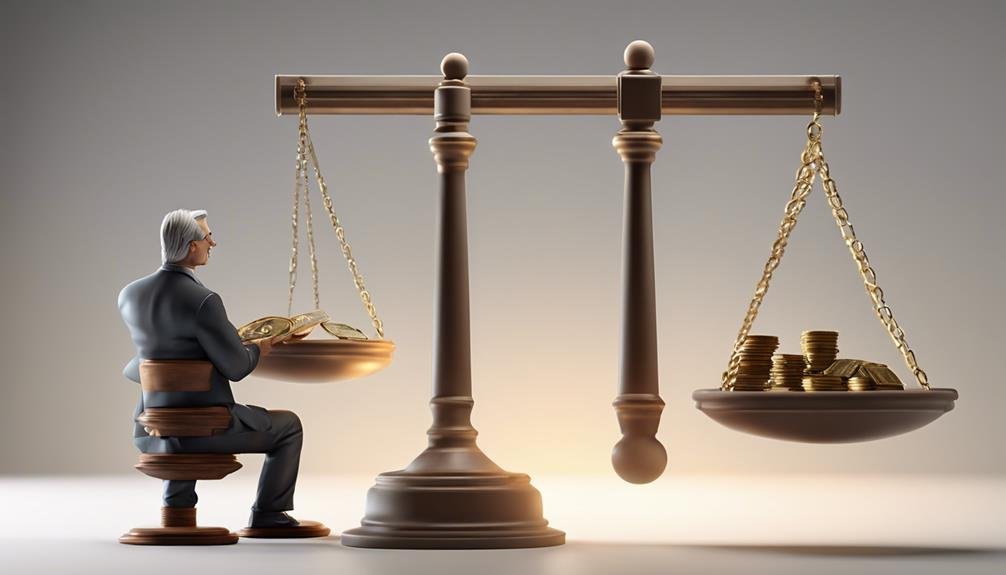Debt Settlement Vs. Bankruptcy: What You Need to Know
Understanding debt relief options involves grasping key variances between debt settlement and bankruptcy. Debt settlement entails negotiating with creditors to lower total owed, affecting credit score. Bankruptcy, on the other hand, involves court oversight, impacting credit for years. Assess eligibility based on income, debt, assets. Consider structured payments or quick settlements. Understand tax implications, credit damage, and long-term effects on financial health. Seek professional guidance to navigate legal complexities and safeguard rights. Knowing the nuances between these options will help you make informed decisions for your financial future.
Key Takeaways
- Debt settlement reduces total debt, while bankruptcy discharges most debts.
- Bankruptcy impacts credit score for up to 10 years; debt settlement has potential tax consequences.
- Bankruptcy offers a fresh start but affects credit; debt settlement may have quicker resolution.
- Legal implications differ: debt settlement involves negotiation, while bankruptcy is a court overseen process.
- Consider long-term financial effects, future borrowing limitations, and overall impact on financial health.
Understanding Debt Settlement
Understanding debt settlement involves negotiating with creditors to pay off a portion of your outstanding debt in exchange for the remainder being forgiven. Debt negotiation is a critical aspect of debt settlement, where you or a professional negotiator work with your creditors to reach an agreement on reducing the total amount owed.
This process can help you settle your debts for less than what you owe, providing a pathway to financial recovery. Credit counseling is often a valuable resource for individuals considering debt settlement. These services offer guidance on managing debt, creating budgets, and negotiating with creditors.
By seeking credit counseling, you can gain insights into your financial situation and explore potential debt relief options. Through a combination of debt negotiation and credit counseling, you can take proactive steps towards resolving your debts and achieving financial stability.
It's crucial to approach debt settlement with a clear understanding of the process and seek professional advice to navigate the complexities of managing your debt effectively.
Exploring Bankruptcy Options
When considering bankruptcy as a financial option, it's important to understand the different types available, such as Chapter 7 and Chapter 13.
Evaluating your eligibility criteria for each type is pivotal to determine which one aligns best with your financial situation.
Moreover, it's imperative to weigh the potential impact on your credit score before proceeding with any bankruptcy filing.
Bankruptcy Types Overview
Considering bankruptcy as a financial option involves examining various types to determine the most suitable path for your circumstances. Two common types of bankruptcy in the United States are Chapter 7 and Chapter 13 bankruptcy. Both options can provide debt relief, but they operate differently regarding eligibility, repayment plans, and asset retention. Here's a brief overview:
| Bankruptcy Type | Description | Key Features |
|---|---|---|
| Chapter 7 | Liquidation bankruptcy where non-exempt assets are sold to repay creditors. | Quick process, no repayment plan, asset liquidation |
| Chapter 13 | Restructuring bankruptcy where a repayment plan is created to pay off debts over 3-5 years. | Allows you to keep assets, structured repayment plan, longer process |
Understanding the distinctions between Chapter 7 and Chapter 13 bankruptcy can help you make an informed decision when considering debt settlement negotiation or other debt relief options. Consulting with a bankruptcy attorney is crucial to assess your specific financial situation and determine the most appropriate path forward.
Eligibility Criteria Check
To determine your eligibility for bankruptcy options like Chapter 7 or Chapter 13, you must evaluate specific criteria related to your financial situation. This involves a thorough financial evaluation, including an income review, debt to income ratio analysis, and asset assessment.
Firstly, your income evaluation is important in determining which type of bankruptcy you may qualify for. Chapter 7 bankruptcy typically requires that your income is below a certain threshold, whereas Chapter 13 considers your income in establishing a repayment plan.
Secondly, your debt to income ratio plays a significant role in the eligibility criteria. A high debt to income ratio may indicate a greater need for bankruptcy relief, especially under Chapter 7.
Lastly, an asset assessment is essential to determine how your assets will be handled in the bankruptcy process. Understanding the value of your assets and how they're protected under bankruptcy laws is crucial for evaluating your eligibility for different bankruptcy options.
Impact on Credit
Your credit score can be greatly impacted by the decision to pursue bankruptcy as a solution to your financial challenges. Filing for bankruptcy typically stays on your credit report for up to 10 years, affecting your ability to secure loans, credit cards, or favorable interest rates during that time.
While it may seem like a drastic measure, bankruptcy can provide a fresh start for individuals overwhelmed by debt and unable to see a way out. However, it's essential to understand that rebuilding your credit after bankruptcy can be a gradual process that requires patience and diligence.
In terms of credit repair, bankruptcy can be a significant setback initially, but it doesn't mean your financial recovery is impossible. Many individuals who've gone through bankruptcy have been able to bounce back and improve their credit scores over time.
Eligibility Criteria
To determine your eligibility for debt settlement or bankruptcy, you need to take into account specific requirements and factors.
Debt settlement typically requires you to have a certain amount of debt that you can't repay in full, while bankruptcy eligibility factors include your income, assets, and type of debt.
Understanding what it takes to qualify for either debt relief option is essential in deciding which route is best for your financial situation.
Debt Settlement Requirements
Meeting specific eligibility criteria is essential when considering debt settlement as an option to manage your financial obligations. To initiate the debt settlement process, it's important to be facing a legitimate financial hardship that has made it challenging for you to meet your debt obligations. Typically, creditors are more willing to negotiate a settlement if they believe you're genuinely struggling financially. Thus, demonstrating your financial hardship through documentation such as bank statements, income statements, and expense reports is crucial.
Settlement negotiation tactics play a significant role in debt settlement requirements. Being prepared to negotiate with creditors or collection agencies is important. It's essential to have a clear understanding of your financial situation and a realistic settlement offer that you can afford. Additionally, knowing when to seek professional help from a reputable debt settlement company or attorney can greatly impact the success of your settlement negotiations.
Bankruptcy Eligibility Factors
Eligibility for bankruptcy is determined by specific factors that assess your financial situation and ability to repay debts. When considering bankruptcy, two key criteria are essential in determining your eligibility:
- Income Assessment: One of the primary factors in determining bankruptcy eligibility is your income. The court will evaluate your income to assess whether you meet the criteria for filing under Chapter 7 or Chapter 13 bankruptcy.
- Asset Evaluation: Another critical aspect is the evaluation of your assets. The court will examine your assets to determine if they can be liquidated to repay your debts. This evaluation plays a significant role in the bankruptcy process.
- Debt-to-Income Ratio: Your debt-to-income ratio is also taken into account. A high ratio may indicate a need for bankruptcy relief, while a low ratio might suggest an alternative solution.
- Type of Debt: The type of debt you have can impact your bankruptcy eligibility. Certain debts may not be dischargeable in bankruptcy, affecting the overall assessment of your eligibility.
Qualifying for Debt Relief
Considering your financial circumstances, understanding the eligibility criteria for debt relief is essential to determine the most suitable path forward.
When it comes to qualifying for debt relief, one of the key factors is the income evaluation. Lenders or debt relief agencies may assess your income to determine if you qualify for certain programs like debt settlement. Your income level can influence the type of relief options available to you.
Additionally, undergoing debt counseling is often a requirement for debt relief programs. Debt counseling helps individuals understand their financial situation better, learn budgeting skills, and explore available debt relief options. It's a valuable resource that can guide you towards making informed decisions regarding your debt management.
Impact on Credit Score
Understanding how debt settlement and bankruptcy impact your credit score is essential for making informed financial decisions. When it comes to credit scores, both options can have significant consequences. Here's what you need to know:
- Debt Settlement:
Debt settlement may lead to a lower credit score initially due to missed payments during the negotiation process. Over time, successful debt settlements can improve your credit score as you reduce your overall debt burden.
- Bankruptcy:
Filing for bankruptcy typically results in a more severe negative impact on your credit score compared to debt settlement. Despite the initial hit, bankruptcy can provide a fresh start for your finances, leading to potential credit repair and long-term financial recovery.
Consider the long-term implications of each option on your credit score as you weigh the decision between debt settlement and bankruptcy. Remember that credit repair and financial recovery are achievable goals with the right strategy in place.
Legal Implications
Exploring the legal implications of debt settlement and bankruptcy is essential for making informed decisions about resolving your financial situation. When considering debt resolution options, it is vital to understand the legal consequences and financial implications associated with each choice.
One of the key differences between debt settlement and bankruptcy lies in the court process involved. In bankruptcy, a legal process is initiated in which a court helps to reorganize or discharge your debts under the protection of the bankruptcy laws. On the other hand, debt settlement typically involves negotiating with creditors to reduce the total amount owed without involving the court system.
To further highlight the legal implications of debt settlement versus bankruptcy, the table below summarizes the key differences in court involvement and financial consequences:
| Aspect | Debt Settlement | Bankruptcy |
|---|---|---|
| Court Process | Negotiation with creditors | Legal process overseen by court |
| Financial Implications | Debt reduction | Debt reorganization or discharge |
Debt Repayment Process
The debt repayment process involves addressing outstanding balances through structured payments or negotiated settlements. When dealing with debt negotiation, it's important to understand the various repayment options available to you. Here are key points to keep in mind:
- Structured Payments: Setting up a structured payment plan allows you to pay off your debts in regular installments over an agreed period. This method can help you manage your finances better and avoid defaulting on payments.
- Negotiated Settlements: Debt negotiation involves reaching an agreement with creditors to settle the debt for less than the full amount owed. This option can provide a quicker resolution and potentially reduce the total debt burden.
- Balancing Priorities: When considering repayment options, it's crucial to balance your financial priorities and obligations to determine the most suitable approach for your situation.
- Credit Impact: Both structured payments and negotiated settlements can impact your credit score differently, so it's important to weigh the potential consequences before deciding on a repayment strategy.
Pros and Cons
Considering the advantages and disadvantages of debt settlement and bankruptcy is vital when evaluating your financial options. Both options have distinct financial implications that can greatly impact your decision-making process.
Debt settlement offers the advantage of potentially reducing the total amount of debt owed by negotiating with creditors for a lower payoff amount. This can help you avoid bankruptcy and maintain a better credit score. However, it may also result in tax consequences and damage to your credit report.
On the other hand, bankruptcy provides a more structured approach to debt relief, offering a fresh start by discharging most or all of your debts. While this can provide immediate relief from overwhelming debt, it comes with long-term financial implications such as a significant hit to your credit score and potential limitations on future credit opportunities.
When weighing the pros and cons of debt settlement and bankruptcy, it's essential to take into account your current financial situation, long-term goals, and the impact each option will have on your financial stability. Making an informed decision based on these factors is key to finding the best solution for your financial well-being.
Long-Term Financial Effects
Evaluating the long-term financial effects of debt settlement and bankruptcy is essential for making an informed decision about your financial future.
When weighing your options, consider the following:
- Financial Stability: Debt settlement may provide a quicker resolution, allowing you to regain financial stability sooner than if you opt for bankruptcy. However, bankruptcy offers a more structured approach to eliminate debt entirely.
- Credit Consequences: Both debt settlement and bankruptcy can impact your credit score. Debt settlement reflects negatively on your credit report but allows for gradual improvement as debts are settled. Bankruptcy, while having a severe initial impact, offers a clean slate for rebuilding credit in the long term.
- Future Borrowing: Bankruptcy can make it challenging to secure loans or credit cards immediately after filing. Debt settlement may also affect your ability to borrow, albeit to a lesser extent.
- Overall Financial Health: Consider how each option aligns with your long-term financial goals and the impact it will have on your financial health moving forward.
Seeking Professional Guidance
For informed decision-making regarding debt settlement and bankruptcy, seek guidance from a qualified financial professional. Financial counseling is essential to understand the implications of each option on your financial situation. A financial counselor can assess your income, expenses, and debts to provide personalized advice on the best course of action. They can help you create a realistic budget, negotiate with creditors, and explore alternatives to bankruptcy.
Additionally, legal advice is vital when considering debt settlement or bankruptcy. A qualified attorney specializing in financial law can explain the legal processes involved, including the implications for your assets and credit score. They can guide you through the complexities of bankruptcy laws and make sure that you fulfill all legal requirements.
Legal advice can also protect you from potential creditor harassment and ensure that your rights are upheld throughout the debt resolution process.
Frequently Asked Questions
Can I Choose Both Debt Settlement and Bankruptcy?
You cannot choose both debt settlement and bankruptcy simultaneously. Combining options may have serious financial implications. It's crucial to weigh the pros and cons of each strategy carefully and seek professional advice to make an informed decision.
Will Debt Settlement Affect My Ability to Get New Credit?
When you opt for debt settlement, your credit may take a hit. It could affect your ability to secure new credit in the future. Consider how this may impact your borrowing opportunities before proceeding.
How Long Does Bankruptcy Stay on My Credit Report?
Bankruptcy typically stays on your credit report for 7-10 years. It can have a significant impact on your credit score, making it challenging to get loan approvals. Rebuilding credit post-bankruptcy requires careful financial planning and time.
Can I Choose Bankruptcy if I Have Multiple Debts?
If you're facing multiple debts, bankruptcy may be an option. Prior to deciding, seek advice from a credit counselor or consider debt consolidation. Understanding the implications and exploring alternatives is essential for informed decisions.
What Are the Costs Associated With Debt Settlement and Bankruptcy?
When considering costs, debt settlement may have lower upfront fees but can lead to tax consequences. Bankruptcy involves court fees but can provide relief from most debts. Legal implications vary, so seek professional advice.
Conclusion
In the journey of financial struggle, deciding between debt settlement and bankruptcy is like traversing a winding road with two distinct paths. Each option holds its own challenges and rewards, much like the diverging roads that lead to different destinations.
It's important to weigh the pros and cons carefully, seeking guidance from professionals to guarantee a smooth and successful journey towards financial stability.








